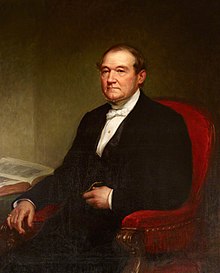William Backhouse Astor Sr
| William Backhouse Astor Sr. | |
|---|---|

Astor, c. 1850
|
|
| Born |
September 19, 1792 New York City, New York, U.S. |
| Died | November 24, 1875 (aged 83) New York City, New York, U.S. |
| Resting place | Trinity Church Cemetery, New York City, New York, U.S. |
| Spouse(s) | Margaret Alida Rebecca Armstrong (m. 1818; her death 1872) |
| Children | Emily, John, Laura, Mary, William Jr., Henry, and Sarah |
| Parent(s) |
John Jacob Astor Sarah Cox Todd |
| Relatives | See Astor family |
| Signature | |
William Backhouse Astor Sr. (September 19, 1792 – November 24, 1875) was an American business magnate who inherited most of his father John Jacob Astor's fortune. He worked as a partner in his father's successful export business. His massive investment in Manhattan real estate enabled major donations to the Astor Library in East Village, which became the New York Public Library.
William was born in New York City to fur-trader John Jacob Astor (1763–1848) and Sarah Cox Todd (1761–1834). His seven siblings were Magdalena (1788–1832), Sarah (1790–1790), John Jr. (1791–1869), Dorothea (1795–1874), Henry (1797–1799), Eliza (1801–1838), and an unnamed brother who died shortly after his November 13, 1802 birth.
He attended local public schools. His spare hours and vacations were employed in assisting his father in the store. When he was sixteen, he was sent to the University of Göttingen in Germany, where he joined the German Student Corps Curonia of the Baltic German students; later he moved to the University of Heidelberg. He chose as his tutor a student, afterward known as the Chevalier Christian Charles Josias von Bunsen, with whom he also traveled.
In 1815, he returned to the United States and entered partnership with his father, who changed the name of his firm to John Jacob Astor & Son and engaged in the China trade. William's elder brother, occasional poet John Jacob Astor Jr., was sickly and mentally unstable. John Jr. was left incapable of working in the firm. He worked there until his father's death. One source argued that his role in the company was never anything more than as "an industrious and faithful head clerk", despite his official title of head of the firm's chief subsidiary, the American Fur Company, in its last several years of its ownership by Astor & Son.
...
Wikipedia
